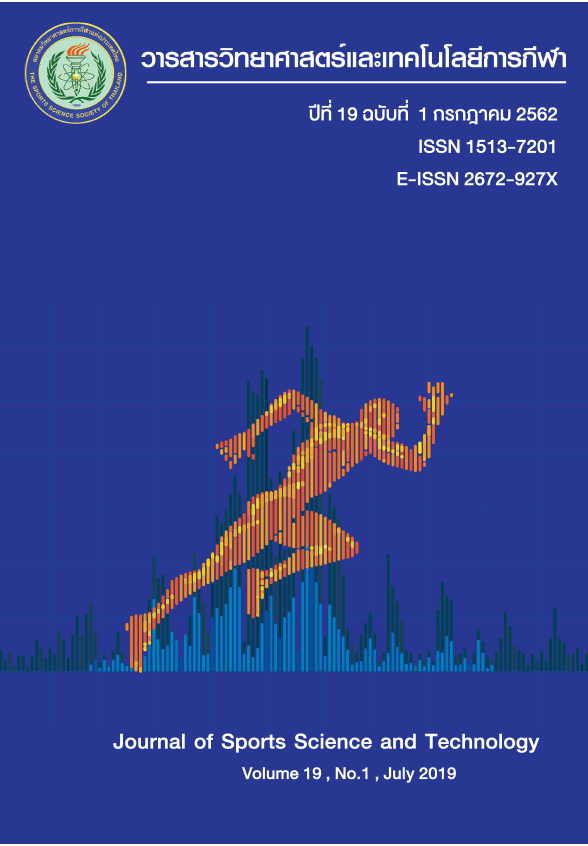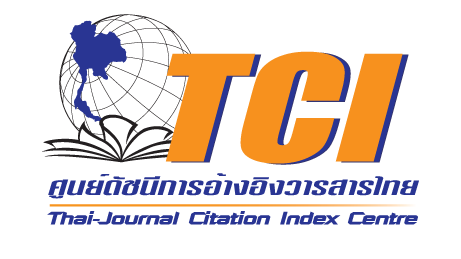RESPIRATORY MUSCLE TRAINING IN STRENUOUS SPORT
Keywords:
Respiratory muscle training, Strenuous sport, การฝึกกล้ามเนอื ้ หายใจ, กีฬาประเภททนทานที่มีความหนักสูง,การล้าของกล้ามเนอื ้ หายใจAbstract
Work of respiratory muscles in strenuous sport like rowing, swimming, running and cycling is important as same as work of limb and core muscles. Because of fatigue in the respiratory muscle can affects the performance of strenuous sport. Moreover, there were studies concerning about the effect of respiratory muscle on breathing quality and exercise performance. Hence, the purpose of this study is to review and describe effects of respiratory muscle training on strenuous sport performance and respiratory muscle training program from previous research. During high intensity exercise, work of respiratory muscle is hard. This condition result in respiratory muscle fatigue and exercise performance impairment. The respiratory muscle training can improve respiratory muscle strength and exercise endurance. In general, respiratory muscle training program consists of 2 types; resistance training and endurance training. Moreover, each type of respiratory muscle training programs is specific to each type of strenuous sports. Conclusion, respiratory muscle training can enhance strenuous sport performance by applying appropriate training program that is specific to each type of strenuous sport.
(Journal of Sports Science and Technology 2019; 19(1): 8-24)
(Received: 10 August 2018, Revised: 4 February 2019, Accepted: 20 February 2019)
Keywords: Respiratory muscle training / Strenuous sport / Respiratory muscle fatigue
References
2. Derchak PA, Sheel AW Morgan BJ, Dempsey JA. Effects of expiratory muscle work on muscle sympathetic nerve activity. J Appl Physiol 2002;92(4):1593-52.
3. Mcconnell AK, Lomax M. The influence of inspiratory muscle work history and specific inspiratory muscle training upon human limb muscle fatigue. J Physiol 2006;557(Pt1):445-57.
4. Lomax ME, Mcconnell AK . Inspiratory muscle fatigue in swimmers after a single 200 m swim. J Sports Sci 2003;21(8):659-64.
5. Volianitis S, Mcconnell AK, Koutedakis Y, Mcnaughton L, Bacxx K, Jones DA. Inspiratory muscle training improve rowing performance. Med Sci Sports Exerc 2000;33(5):803-9.
6. Verges S, Lenherr O, Hence AC, Schulz C, Spengler CM. Increased fatigue resistance of respiratory muscles during exercise after respiratory muscle endurance training. Am J Physiol Regul Integr Comp Physiol 2007;292(3):1246-53.
7. I lli SK, Held U, Frank I, Spengler CM. Effect of respiratory muscle training on exercise performance in healthy Individuals: a systematic review and meta-analysis. Sports Med 2012;42(8):707-24.
8. Mckenzie DC.Respiratory physiology: adaptations to high-level exercise. Br J Sports Med.2012;46(6):381-4.
9. Loke J, Mahler DA, Virgulto JA. Respiratory muscle fatigue after marathon running. J Appl Physiol Respir Environ Exerc Physiol 1982;52(4):821-4.
10. Dempsey JA, Romer L, Rodman J, Miller J, Smith C. Consequences of exercise-induced respiratory muscle work. Respir Physiol Neurobiol 2006;151(2-3):242-50.
11. Mcconnell AK. Respiratory muscle training; Theory and Practice. First ed. Oxford:Elsevier; 2013
12. Leith DE, Bradley M. Ventilatory muscle strength and endurance training. J Appl Physiol. 1976;41(4):508-16.
13. Wylegala JA, Pendergast DR, Gosselin LE, Warkander DE, Lundgren CE. Respiratory muscle training improves swimming endurance in divers. Eur J Appl Physiol 2007;99(4):393-404.
14. Kilding AE, Brown S, Mcconnell AK. Inspiratory muscle training improves 100 and 200 m swimming performance. Eur J Appl Physiol 2010;108(3):505-11.
15. Frederic L, Jeremy BC, Florence C, Ingrid C, Patrick M, Guillaume C, Didier C. Effect of additional respiratory muscle endurance training in young well-trained swimmers. J Sports Sci Med 2013;12(4):630-8.
16. Edwards AM, Wells C, Butterly R. Concurrent inspiratory muscle and cardiovascular training differentially improves both perceptions of effort and 5000 m running performance compared with cardiovascular training alone. Br J Sports Med 2008;42(10):823-7.
17. Edwards AM, Cooke CB. Oxygen uptake kinetics and maximal aerobic power are unaffected by inspiratory muscle training in healthy subjects where time to exhaustion is extended. Eur J Appl Physiol 2004;93(1-2):139-44.
18. Power breathe.com[Internet].POWER breatheK5. [Cited 2018 Dec 16].Available from:https://www.powerbreathe.com/.
19. Mcconnell AK, Romer LM. Respiratory muscle training in healthy humans: resolving the controversy. Int J Sports Med 2004;25(4):284-93.
20. Trainair.co.uk[Internet].The TRAINAIR Website – Home of respiratory training. [Cited 2018 Nov 11] Available from: https://www.trainair.co.uk/.
21. Uemura H, Lundgren CE, Ray AD, Pendergast DR. Effects of different types of respiratory muscle training on exercise performance in runners. Mil Med 2012;177(5):559-66.
22. Mohamadi MR, Mirdar S. The Effect of an inspiratory muscle training period at high altitude on arterial oxygen saturation and performance of Iran’s national team endurance runners. J Pulm Respir Med 2016;6(3):1-5.
23. Leddy JJ, Limprasertkul A, Patel S, Modlich F, Buyea C, Pendergast DR, Lundgren CE. Isocapnic hyperpnea training improves performance in competitive male runners. Eur J Appl Physiol 2007;99(6):665-76.
24. Suzuki S, Suzuki J, Okubo T.Expiratory muscle fatigue in normal subjects.J Appl Physiol.1991;70(6):2632-9.
25. Griffith LA, Mcconnell AK. The influence of inspiratory and expiratory muscle training upon rowing performance. Eur J Appl Physiol 2007;99(5):457-66.
26. Toraa M, Friemel F. Fatigue of the respiratory muscles due to maximal exercise on 2 different ergometers. Can J Appl Physiol 2000;25(2):87-101.
27. Ross E, Middleton N, Shave R, George K, Mcconnell A. Changes in respiratory muscle and lung function following marathon running in man. J Sports Sci 2008;26(12):1295-301
28. Sabine KL, Ulrike H, Ire`ne F, Christina MS. Effect of Respiratory Muscle Training on Exercise Performance in Healthy Individuals A Systematic Review and Meta-Analysis. J Sports Med 2012;42(8):707-24.
29. Mickleborough TD, Nichols T, Lindley MR, Chatham K, Lonescu AA. Inspiratory flow resistive loading improves respiratory muscle function and endurance capacity in recreational runners. Scand J Med Sci Sports 010;20(3):458-68.
30. Matthew WD, Carl DP. The effects of respiratory muscle training in highly-trained rowers. J Exerc Physiol Online 2012;15(6):93-102.
31. Verges S, Renggli AS, Notter DA. Spengler CM. Effects of different respiratory muscle training regimes on fatigue-related variables during volitional hyperpnoea. Respir Physiol Neurobiol 2009;169(3):282-90.
32. Mcconnell AK, Sharpe GR. The effect of inspiratory muscle training upon maximum lactate steadystate and blood lactate concentration. Eur J Appl Physiol. 2005;94(3):277-84
33. Brown PI, Sharpe GR, Johnson MA. Inspiratory muscle training reduces blood lactate concentration during volitional hyperpnoea. Eur J Appl Physiol 2008;104(1):111–7.
34. Witt JD, Guenette JA, Rupert JL, McKenzie DC, Sheel AW. Inspiratory muscle training attenuates the human respiratory muscle metaboreflex. J Physiol. 2007;584(Pt3): 1019–28.
35. Steinacker JM, Both M, Whipp BJ. Pulmonary mechanics and entrainment of respiration and stroke rate during rowing. Int J Sports Med 1993;14(1):s15-9.
36. Siegmund GP, Edward MR, Moore KS, Tiessen DA, Sanderson DJ, McKenzie DC. Ventilation and locomotion coupling in varsity male rowers. J Appl Physiol 1999;87(1):233-42.
37. Forbes S, Game A, Syrotuik D, Jones R, Bell GJ. The Effect of Inspiratory and expiratory respiratory muscle training in rowers. Res Sports Med 2011;19(4):217-30.
38. Formiga MF, Roach KE, Vital I. Urdaneta G, Balestrini K, Calderon-Candelario RA, Campos MA, Cahalin LP. Reliability and validity of the test of incremental respiratory endurance measures of inspiratory muscle performance in COPD. Int J Chron Obstruct Pulmon Dis 2018;13:1569-76.
39. Lindholm P, Wylegala JA, Pendergast DR, Lundgren CE. Resistive respiratory muscle training improves and maintains endurance swimming performance in divers. Undersea Hyperb Med 2007;34(3):169-80.
40. Ray AD, Pendergest DR, Lundgren CE. Respiratory muscle training improves swimming endurance at depth. Undersea Hyperb Med 2008;35(3):185-96.
41. Jana V, Katerina N, Zbynek S. The Effect of respiratory muscle training on fin-swimmers’ performance. J Sports Sci Med 2017;16(4):521-6.
42. Ferren AR and Alois M. Energy systems in swimming. In: Ludovic S, Didier C, Inigo M, editors. World book of swimming: from science to performance. New York, Nova science publishers; 2011. 225-40.
43. Paige H, Angela S, Ralph FF. Endurance training of respiratory muscles improves cycling performance in fit young cyclists. BMC Physiol 2004;4(9):1-14.
44. Romer LM, Mcconnell AK, Jones DA. Effects of inspiratory muscle training on time-trial performance in trained cyclists. J Sports Sci 2002;20(7):547-62.
45. Sonetti DA, Wetter TJ, Pegelow DF, Dempsey JA. Effects of respiratory muscle training versus placebo on endurance exercise performance. Respir Physiol 2001;127(2-3):185-99.






